
Occupancy of Kyiv’s hotels in the highest peak of the tourist season (May-August) grew by 1.6 percentage points (p.p.) in the upscale segment, to 47% and by 5 p.p. in the midscale segment, to 56%, the press service of Jones Lang LaSalle (JLL) in Ukraine has reported. According to JLL, Average Daily Room Rate (ADR) in the upscale hotel segment in Kyiv in May-August 2018 grew to $175, which is 10% more than in May-August 2017, while Revenue Per Available Room (RevPAR) grew by $13, to $85.
“May was the month when hotels were occupied the most, when the UEFA Champions League final took place. This event… allowed hotels of the upscale segment to reach occupancy of 59% with the increase of ADR by almost 40%, to $230,” Head of the Hotels & Hospitality Department at JLL Tetiana Veller said.
According to the JLL report, in the midscale segment of the Kyiv’s hotels there was a decrease in ADR by an average of 10%, to $80. At the same time, due to the increase in the occupancy to 56%, RevPAR in this segment increased to $45.
According to the consulting company, Kyiv hotels in the eight months ending August 2018 showed an increase in occupancy by 1 p.p. in the upscale segment and by 2 p.p. in the midscale segment, the growth of ADR – by $15 in the upscale and $2 in the midscale.
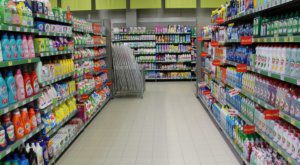
The Biosphere Corporation (Dnipro), a large producer of home and personal care products, has entered the Polish market, signing an agreement on supplies of moist wipes Smile under the license of The Walt Disney Company and Universal with the Biedronka retail chain. “Biosphere Corporation entered the Polish market with a contract with the Biedronka chain. In one of the largest Polish networks, which includes more than 2,800 stores across the country, 15 names of the Smile brand will be presented under the license of The Walt Disney Company and Universal. Thus, the Smile brand was the first in Poland with an official license from the two largest Western studios. In the nearest future the corporation plans to enter other chains of this country,” the press service of the Biosphere Corporation said.
The corporation was also informed about the exclusive license from The Walt Disney Company and Universal, with which it has been cooperating since 2012, for using cartoon characters on the moist wipes Smile on the Polish market.
Biosphere Corporation, which has been operating in Ukraine for over 20 years, is the leader in the production and distribution of home and personal care products in Ukraine and the CIS. Its products are represented on some 20 markets in Europe and Asia. In the product portfolio the company has more than 2,000 items.
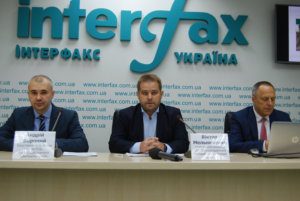
One third of state-managed forestry enterprises (27%) are left without connection to the wood electronic management system (WEM), in particular, this concerns forest management enterprises subordinated to the Education Ministry, Defense Ministry, as well as municipal forests and forests of regional automobile agencies, Director General of the state-owned enterprise (SOE) Ukrainian Forestry Innovation and Analytical Centre Viktor Melnychenko has said.
“In 2010, we, together with our partners, Latschbacher, started developing a wood electronic management system that allows us to trace the process of logging and selling wood, and it has been introduced in all enterprises of the State Forestry Agency of Ukraine since 2012. In general, the system covers 73% of state-owned forestry enterprises,” he said at a press conference at the Kyiv-based Interfax-Ukraine news agency.
At the same time, Melnychenko said that the government resolution on the creation of a pilot project for the implementation of the electronic logging system for the second year remains without consideration, whereas its adoption could favor the connection of all state-owned forestry enterprises to the system.
According to Melnychenko, the system introduced in 2012 has been supplemented with new modules and applications that allow the public and law enforcement agencies to receive information on wood accounting.
“After logging we mark the wood with a special plastic tag with a barcode, then move it and sell it. A year ago we introduced the “Police” application created to track and verify the movement of the wood along public roads. Today we present the “Certificate” application,” the representative of the developer of the WEM system – the Austrian company Latschbacher GmbH, Volodymyr Molochko, said at the press conference.
According to him, when issuing a certificate of origin for wood, the system automatically checks the availability of documents for legally acquired wood. The certificate itself, allowing tracing the entire supply chain, is transferred by the WEM system to the customs system of Ukraine in electronic and encrypted form.
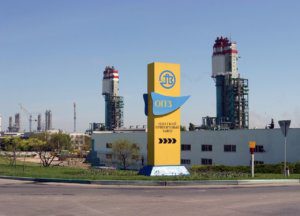
ETFX UK Group (Oman) has won a tender to use the facilities of PJSC Odesa Port-Side Plant on the tolling terms, First Deputy Director of the plant Mykola Schurikov has said. “After counting the points of the participants, ETFX UK Group receives the maximum number of points,” he wrote on Facebook. ETFX UK Group offered Odesa Port-Side Plant to pay for its work at $34 per tonne of produced ammonia and $46.5 per tonne of produced urea.
According to Schurikov, besides the winner, the bids were submitted by International V.T.I. Group Holding B.V. (the United States) and Boros LLC, but their packages of documents were incomplete.
International V.T.I. Group, as well as Trameta K.S. (Slovakia) requested an extension of the deadline for filing documents, but the tender commission did not find the necessary grounds for this.
As reported, Odesa Port-Side Plant refers to work on the tolling terms as the only possible option for resuming operations in the conditions of failure of privatization attempts and accumulated debt for gas to Naftogaz Ukrainy, which exceeds UAH 1.5 billion.
The state-owned Odesa Port-Side Plant produces chemical products, and also transships ammonia to sea transport.
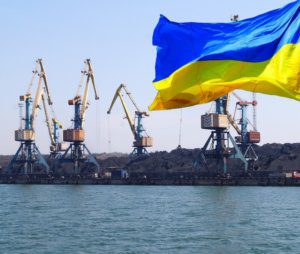
MV Cargo plans to start assembling a ship loader for the grain terminal of global trader Cargil at the Yuzhny seaport in October 2018. “The berth is almost a half ready, and the silos are at the finish line. In autumn they will be able to accept first grain. In October we will start assembling the ship loader,” the company said on its Facebook page. The company said that as of the second half of September, the project to build a grain terminal was implemented by 85%, and the terminal will be capable of storing 290,000 tonnes of grain.
The length of the berth is 428 meters, depth near the berth is 15 meters and depth of the approaching canal is 16 meters.
“Our terminal is one of the deepest grain terminals in Ukraine and the Black Sea region, and, if necessary, the depth of the berth can be increased to 16 meters and the approach canal – to 19 meters. The length of the berth wall and depth will allow us to accept large-tonnage vessels, and modern equipment – to load a ship like Post-Panamax in two or three days,” MV Cargo said.
It is planned that after the launch of the terminal, the terminal will ensure transshipment of 10% of grain produced in Ukraine.
ASSEMBLING, MV CARGO, ODESSA REGION, SHIP LOADER, YUZHNY SEAPORT
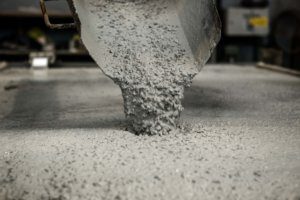
BASF, an international chemical producer, is to invest EUR 2 million in a new plant that will produce concrete additives in the town of Obukhiv, Kyiv region, which is to open next spring, Managing Director (CEO) at BASF Ukraine Andreas Lier has said. “There will be about EUR 2 million in investment. This is our first investment in Ukraine. If it is successful, we will continue investing in this production. We have already been present in the Ukrainian market with these products for several years. We have been importing this product for a long time, but now we’ve decided we want to produce it here,” Lier told Interfax-Ukraine.
BASF’s National Development Manager Oleksandr Ruban says that the plant’s production capacity will be 10,000 tonnes of produce per year with the possibility of boosting the output in future. The plant is scheduled to be launched in March-April 2019.
Production in Ukraine will halve the price of concrete additives and will also allow the company to significantly increase its market share.
“Now we are bringing all the additives from abroad, and our share in the market is very small – less than 1%. We plan to grow up to 10% of the market in the first year,” Ruban said in a comment to the Kyiv-based Interfax-Ukraine news agency.
Governor of Kyiv region Oleksandr Horhan forecasts that the production of the additives at the plant in Obukhiv will speed up the pace of construction in Kyiv region.
“Kyiv region is the leader in construction. These additives will make frame-monolithic construction possible amid sub-zero temperatures, allowing construction all the year round. Now such additives are available on the market, but they are imported and expensive,” Horhan said.